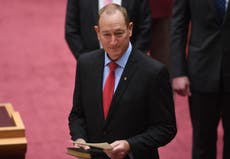The Independent's journalism is supported by our readers. When you purchase through links on our site, we may earn commission.
Farage’s speaking tour of Australia won’t successfully galvanise the far-right – their work has already been done
Unlike in the US or the UK, Australia’s inhumane border policy has been brutally effective at deterring asylum seekers from trying to gain access to Australia illegally

You can tell how popular Brexit is by how much time Nigel Farage commits to spending in the UK. Recently, he’s been a staple on America’s Fox News, spouting his support for Donald Trump. But now, he’s got his sights set on another target: Australia.
Over the next few weeks, Farage is embarking on a “speaking tour” of Australia. And, ever the opportunist, he is selling tickets for a one-to-one meeting and a photo for 295 Australian dollars (£166).
So, why – other than to make some easy money – is he heading to Australia? Does he believe that Australia, with it’s golden beaches and easy smiles, is next, in a long list of countries, to be dominated by far-right political forces? Probably.
And it’s easy to see why. Trust in government has been rapidly disintegrating since the first leadership coup in 2010, when Kevin Rudd of the Labor Party was replaced by his deputy, Julia Gillard. By the last election in 2016, trust was at an all-time low, according to the Australian Election Study. Similarly, only 60 per cent of people reported being “satisfied with democracy”.
In fact, the only time dissatisfaction has been higher was in the 1970s when the entire parliament was dissolved. To say that Australia’s political system is in crisis isn’t hyperbole. The government has spent the past decade in turmoil – and the Australian people are tired. Tired of a government that seems more interested in fighting amongst themselves, rather than fighting for the people they represent.
However, while there is dissatisfaction with the current political system, what isn’t present are the same tensions that contributed to the recent rise of the far-right in the UK or the US.
Australia’s universal health care system – for the most part – works and while Australia has managed to avoid the financial crisis that crippled most major economies, people are still concerned about the current state of the economy. In fact, they are far more concerned about the economy than they are about immigration or terrorism.
Australia is so geographically isolated that while those issues register as concerns, most people are more anxious about the rise in unemployment and the affordability of housing. This is in direct contrast to the US in 2016, when the most important issue facing the incoming president was a coin toss between the economy and terrorism. Or the UK in 2016, when immigration was, by far, seen to be the biggest issue facing the country, followed by terrorism.
This is one of the biggest hopes in holding off a far-right uprising in Australia. For people like Farage to gain power, they need to be able to capitalise on one of people’s most basic instincts: fear of the “other”. They need to set up an “us” and “them” dichotomy. The “us” is generally cast as the white, working class, while the “them” refers to both immigrants and out of touch intellectuals who try and tell you that immigrants aren’t the problem. It’s not a particularly clever tactic, but as history has shown, it is effective. It’s the political equivalent of the school yard bully saying, “hey, look over there,” and stealing your lunch money right out of your hand.
The problem with that approach in Australia, is it’s hard to cast a “them”. Immigration is so tightly controlled that it’s largely restricted to highly skilled workers who fill the holes in the Australian labour market. Unlike in the US or the UK, where there was an influx of immigrants – both legal and illegal – Australia’s inhumane border policy, the brainchild of current prime minister, Scott Morrison, when he was the immigration minister in 2013, has been brutally effective at deterring asylum seekers from trying to gain access to Australia illegally. Of course, there are racial tensions, but the “us” and “them” is much harder to cast in Australia than it was for Farage in the UK, or Trump in the US.
The other advantage Australia has is, perhaps, an unlikely one: compulsory voting. Although political apathy is at a record high, people will still show up at the polls. In the UK, only 66 per cent of people voted in the last general election. In the US presidential race, the turn out was at 58 per cent. Meanwhile, in Australia, over 90 per cent of people cast their ballot in the last general election. The far right benefits from low voter turnout, as moderates and the centrists become too disillusioned with politics to show up and cast their vote. But in Australia, the moderates will keep coming to the polls for one reason: because they have to.
Even so, it’s hard to say if these things will be enough to stop a far-right uprising. In the 2016 general election, radical parties to the left and right garnered their highest combined vote since the 1930s, signalling a shift towards the edges of the political spectrum.
If that trend continues, the far-right will almost certainly become a powerful political force, spurred on by Rupert Murdoch, who owns most of the major news outlets. It’s clear why Farage is heading to Australia, and why he believes that his “divide and conquer” tactics will work in a country ravaged by political turmoil. But the structural, social and economic forces of this enormous and prosperous country might just be enough to keep a far right uprising at bay – or at least halt them somewhere over the Indian Ocean.


Join our commenting forum
Join thought-provoking conversations, follow other Independent readers and see their replies